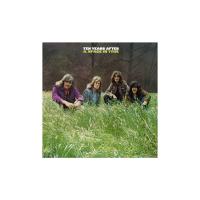British Blues/Psych Classic Reissued by Audio Fidelity
The group played Woodstock and obviously listened to some Moody Blues and Traffic albums too before creating this mix of blues and psychedelic power back in 1971, probably pushed into a more pop vein by Columbia, its new record label.
The album opens with a reverse tape fade-up like Neil Young and Jack N. managed on "Expecting to Fly" and then it's onto a straight forward blues number "One of These Days." The superb sound and production will grab your ears. If you like really well-recorded electric guitar, you'll revel in this track that ends with a high speed rave-up.
"Here They Come" begins with more ear catching studio gimmickry before heading into some beautifully recorded acoustic Moody Blues mysticism slash fire and brimstone "watch out you sinners your time has come" admonishing lyrics. You get the sense that Lee, who was and is foremost a superb guitarist, was pushed into this atmospheric direction, but he makes it work.
Lee wrote one classic cop-out of a protest tune included here: "I'd Love to Change the World." It became a huge radio hit that you'll remember if you're old enough. It's as if Lee felt the obligation to "go protest" but just couldn't pull the trigger.
After singing about "dykes and fairies" and "tax the rich, feed the poor" (clearly not going to be Mitt Romney's campaign theme song), he sings "I'd love to change the world, but I don't know what to do, so I leave it up to you." What a cop out! But also, what a well produced tune that hits all of the major production tricks of the time and incorporates one of the classic guitar riffs of the era. You've never heard it sound this good.
"Over the Hill" with a great string arrangement by Del Newman, also sounds more Dave Mason/Elton John than Muddy Waters, but once Lee has dispensed with the strings and psychedelia (aided in great part by engineer Chris Kimsey's deft work behind the mixing board), he's back to the raving Jerry Lee Lewis-like "Baby Won't You Let Me Rock and Roll You" to close side one.
While Lee can sing okay, his vocalizing is hardly memorable. It's his guitar playing that shines throughout, backed by a strong rhythm section that features long time band mate Leo Lyons (stage name? Or parents with a strange sense of humor?) on bass, Ric Lee (no relation to Alvin, since Alvin's real name is Graham Barnes) on drums and Chick Churchill on keyboards. They'd been playing together for almost a decade when the album was made and you can hear the musical connection is tight.
Side two opens with "Once There Was a Time" a conventional Leadbelly "Take This Hammer" kind of country blues number that's uptempo filler sold by the great playing all around. There are hints of Traffic there, but the next tune "Hard Monkeys" is pure Winwood/Blind Faith "Can't Find My Way Home" with the same drug theme more obviously stated.
And then it's on to yet another Dave Mason influenced tune, sort of a cross between "Feelin' Alright" and "Shouldn't Have Took More Than You Gave" (Mason's Blue Thumb album came out in 1970). Filling out the album is a short uptempo jumpin'jive number that shows off the group's chops.
If you like to rock out, there's plenty of that mixed in with the more dreamy psych stuff, but musically and culturally this album was about following not leading.
The sound on this album, recorded at famed Olympic Studios, is superb throughout—particularly the acoustic and electric guitars. There are real dynamics so you can crank it up and it just keeps rocking. Kevin Gray gets the most from whatever source he's handed and he does his usual excellent work here.
I wish Audio Fidelity would be more forthcoming about source material because the "specially remastered for this LP" sticker doesn't really tell you all that much. From the sound, whatever was used probably began with the analog master tape and that may have been used, or a copy. I'd bet it was analog all the way though.
Whoever produced the reconstituted gatefold jacket messed up the spelling of engineer Chris Kimsey's name, spelling it "Kinsey." Perhaps he or she saw the correct spelling but re-directed it to a certain sex survey.
The Quality Record Pressing pressing lives up to its name. Backgrounds are jet black and clarity is maximum. I can't say this is a "got to have" album from that time, but if you're of a certain age and grew up with this album, this edition probably beats the original given the oil shortage back then, when vinyl pellets had cardboard and BIC pen filler and mastering engineers were cautious with dynamic range. Kevin didn't hit the compression button!



